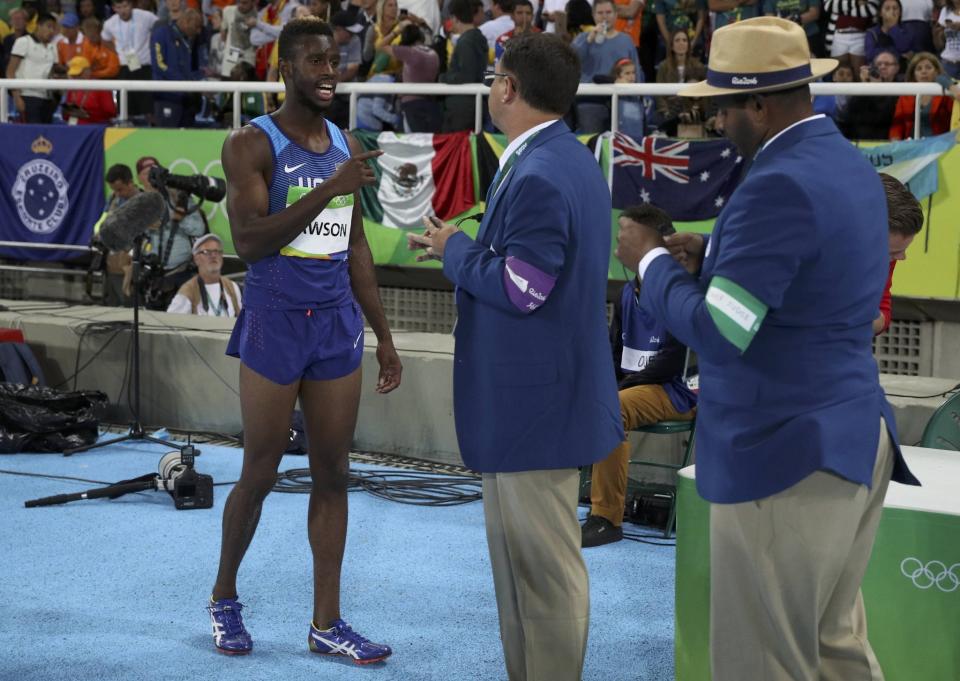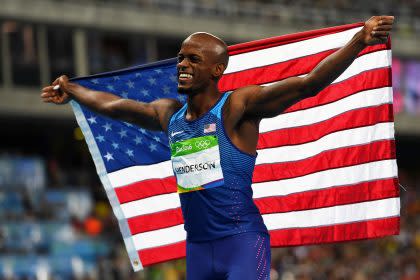The unbelievable mistake that cost an American gold in men's long jump

RIO DE JANEIRO — When Jarrion Lawson’s feet splashed into the sand on the final attempt of Saturday night’s long jump competition, he thought he’d won an Olympic gold medal.
The 22-year-old popped up from the pit and leaped in the air after a jump he was confident would eclipse fellow American Jeff Henderson’s first-place mark of 27 feet, 6 inches.
Lawson’s joy turned to anger and befuddlement when the mark that appeared on the video board was two feet shy of what he expected. He raised his palms in confusion and pointed at his footprints in the pit as his coach leaned over the railing and screamed at the officials that they had made a mistake.
“I thought there was something wrong with the measurement,” Lawson said. “I saw my mark, and I thought it was a winning mark. That’s what I was expecting to see.”
What Lawson didn’t realize was that he’d actually lost the gold medal by a finger tip. Officials ruled that his left hand grazed the sand before his feet touched down, relegating him to fourth place behind Henderson, South Africa’s Luvo Manyonga and 2012 Olympic champion Greg Rutherford of Great Britain.
Before the announcement of Lawson’s score, Henderson had been watching the scene unfold with his hands clasped behind his head and unmistakable tension on his face. The 27-year-old subsequently wrapped an American flag around his shoulders and jubilantly celebrated his victory, though not without a twinge of sadness for his teammate.
[Photos: Faces of Olympic heartbreak]
“It was very close,” Henderson said. “That happens in the long jump when the hand goes back. I’m sad that it happened to him, but he’s a great competitor. He’ll come back next year.”
Lawson’s suspenseful final jump served as a fitting conclusion to an unusually compelling long jump competition. Nobody came remotely close to threatening Mike Powell’s 25-year-old world record, but the lead changed hands five times as the top four jumpers battled relentlessly.
Henderson’s gold medal hopes did not look promising after he did not improve on a solid first jump during the next four rounds, leaving him off the podium heading into his final jump. It was then that Henderson delivered some final-round drama of his own, vaulting to gold medal position with a clutch sixth jump that edged Manyonga’s best mark by just a single centimeter.
The inspiration behind Henderson’s victory was a clever motivational technique employed by his coach. Al Joyner handed Henderson the gold medal he won in the triple jump in 1984 and told him not to return it until he had one of his own.

Henderson’s thrilling victory ended a rare 12-year gold medal drought for the U.S. in the long jump, an event the Americans have now won 22 times since the first modern Olympics in 1896. It also perhaps quieted the legendary Carl Lewis, who has repeatedly called long jump the “worst event in the world” because today’s jumpers don’t jump as far or compete as voraciously as those of his era.
“He’s biting his tongue now,” Henderson said with a smile before explaining that he and Lewis have a friendly relationship.
Seeing Henderson atop the medal stand was especially remarkable considering the academic trouble and family tragedy he has overcome to reach the pinnacle of his sport.
Growing up in a tiny Arkansas town with a population of less than 2,000, Henderson didn’t have access to amenities that some of his peers had. Instead of building strength and explosiveness with a personal trainer at the gym, his high school training regime included pulling a contraption his father built featuring a parachute harness attached to an upside-down car hood with an old engine bolted to it.
Henderson lacked the standardized test scores to attend the SEC schools that recruited him, but he refused to give up on his ambitions of track and field stardom. He won national championships in the long jump and the short sprints at Hinds Community College and at Division II Stillman College, all while his mother was steadily losing her memory and her independence after being diagnosed with Alzheimer’s nearly a decade ago.
“My mom is still fighting, she’s still living,” Henderson said. “She’s bed-ridden right now, but I did this for her.”
The only thing that might have made Henderson’s victory more enjoyable is if it hadn’t come at the expense of a fellow American. As Henderson circled the track with the American flag draped over his shoulders, Lawson walked off in disbelief that he did not win.
Had Lawson’s potential winning jump have counted, it would have been the culmination of a remarkable year for the recent Arkansas grad. Lawson took second place in the long jump behind Henderson at the U.S. Olympic Trials last month and won the 100 meters, 200 meters and long jump at the NCAA championships in June, a triple previously only achieved by Jesse Owens 80 years earlier.
He very nearly added a gold medal to that haul. Instead he was left only with an agonizing near miss.
“It’s very frustrating to know you had the winning mark and to have it knocked out by a mark in the sand,” Lawson said. “Of course I think my jump should have counted, but I’m not going to argue with it. I’m going to take it like a man and get ready for the next four years.”



